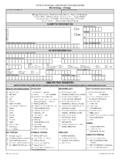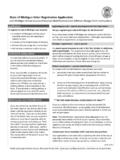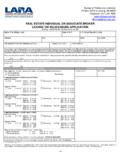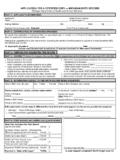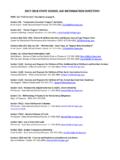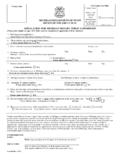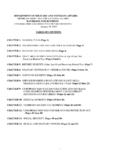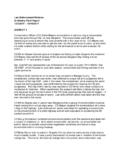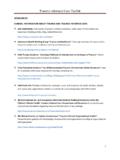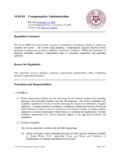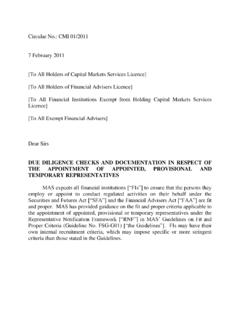Transcription of CSA-CI Guidelines for Foster Parents and Relative Caregiver
1 1 Michigan Department of Human Services CSA Children s Services Administration Communication Issuance Type: Informational Memorandum (IM) Program Instruction (PI) Policy Guide (PG) Issuance Date: 10/15/12 Obsolete Date: n/a Response Due: n/a Log No.: 12 159 Contact: Leslie Adams, or 517 335 0988 Chad Hannahs, or 517 373 2001 Originating Office: Health, Education and Youth Unit (HEYU) Children's Protective Services (CPS) Subject/Title: Guidelines for Foster Parents and Relative Caregivers DHS PUB 268 Distribution: DHS Child Welfare Staff Private Agency Child Welfare Staff CSA Central Office Managers/Staff Native American Tribes Data Management DHS County Directors BCAL CWTI SACWIS Other: Field Operations Administration In a continuing effort meet the health needs of children in care, DHS has partnered with Michigan Department of Community Health to ensure that department policies are aligned related to the requirements for timely completion of comprehensive and ongoing medical and dental examinations.
2 Foster Parents and Relative caregivers play a crucial role in ensuring that Foster children and youth access medical and dental care timely. The DHS PUB 268, Guidelines for Foster Parents and Relative Caregivers for Health Care and Behavioral/Mental Health Services (attached) was created to provide caregivers with an easily accessible reminder of the Foster care health requirements and guidance in accessing medical and mental health care. The DHS PUB 268 contains information for caregivers regarding: Health requirements for Foster children. Behavioral/mental health services. Tips for scheduling and accessing appointments. The DHS PUB 268 is a color printed, laminated handout to allow for durability and convenient posting within the Caregiver home. An initial mailing of the Guidelines will be sent out to 7,200 licensed Foster homes at the end of September, as part of the Foster parent tool kit from the DHS Permanency Division.
3 As new Foster homes become licensed, the DHS PUB 268 will be provided to all DHS and PAFC homes through the monthly mailing of the DHS licensed home welcome letter. Beginning October 1, 2012, children s protective services workers will provide the DHS PUB 268 to all Relative Caregiver homes (only), upon placing children after removal with their relatives. This process will ensure that the Relative Caregiver also has access to the Foster care health Guidelines . Initial supplies of the DHS PUB 268 s were sent to each county (and Wayne County CFS district) CPS office at the end of September. Additional copies may be ordered from the DTMB Warehouse Services. DHS-PUB-268 (9-12) Guidelines FOR Foster Parents AND Relative CAREGIVERS FOR HEALTH CARE AND BEHAVIORAL/MENTAL HEALTH SERVICES When a child first enters Foster care, the caregivers (whether licensed Foster Parents or relatives) receive numerous pieces of information from various sources.
4 At times, it may feel a bit overwhelming. The Guidelines provided here will serve as quick reminder of: Required health care needs for Foster children. Behavioral or mental health services. Caregiver tips for scheduling and facilitating appointments. Health Requirements for Foster Children Behavioral/Mental Health Services All Children Entering Foster care must have an initial comprehensive medical examination within 30 days from the date the child first came into Foster care (regardless of the date of his/her last medical exam). This comprehensive medical exam is known as an EPSDT or Well-Child Exam. Ages 3 through 20 years require yearly medical exams (EPSDT or Well-Child Exam). Under 3 years of age require more frequent medical exams. Ages 3 and older require a dental examination within 90 days of entering Foster care unless the child had a dental exam within 6 months prior to the date.
5 Foster parent or Relative Caregiver responsibility: Arrange for the medical and dental appointments within the noted timeframes. Inform the doctor/dentist office that the child is in Foster care when making the appointment . Provide your Foster care worker with the appointment date for the child s records. Contact the Foster care worker immediately if there is an issue in scheduling or keeping the appointment . At times, children in Foster care may benefit from professional counseling services/therapy. The starting point for behavioral or mental health services is the child s Medicaid Health Plan. When calling to schedule an appointment for mental health/behavioral health services, make note of the following: Identify yourself as the Foster parent to the child (regardless if you are related to the child.) Be specific about your concerns with the child (issues with behavior, mood, sleep patterns, nightmares, bed wetting etc.)
6 Provide information about the medications the child is currently taking, including dosage. Be specific about the reason for the appointment (assessment for services, counseling appointment .) Ensure that you have the child s insurance card and Medicaid identification number available during the call to provide any requested information. Important Notes: Birth Parents should be involved in all mental health appointments. Contact the Foster care worker regarding any/all appointment dates and times or if you have any problems in scheduling the appointment . Examples of a phone call to schedule the Foster child s appointment including the needed information: Foster Parent/ Relative Caregiver : Hello, I would like to make an appointment for a physical exam for my Foster child, (supply child s name). He/she came into Foster care on (give date child entered Foster care) and needs a full well child physical exam before (30 days from the date child entered Foster care).
7 His/her Medicaid coverage is through (name of Medicaid Health Plan) and the Medicaid recipient ID number is (provide Medicaid ID number). Foster Parent/ Relative Caregiver : I am the Foster parent of Johnny Smith. I am calling to schedule an appointment for Johnny to be assessed for services. I am concerned with his behavior as he is having a lot of trouble sleeping, calming down to go to sleep at night, and he isn t sleeping through the night. During the day, he is acting out toward other kids and adults and has started to punch/hit/kick when he gets frustrated. Johnny has McLaren health insurance (Medicaid Health Plan). He currently takes Concerta, 54 mg. in the morning. DHS-PUB-268 (9-12) When going to a medical or therapy appointment , make sure to bring: Child s medications. Child s insurance cards. DHS-3762 Consent to Routine, Non-Surgical Medical Care and Emergency Medical/Surgical Treatment card.
8 Well Child/EPSDT form, needed for the initial, periodic (for children under age 3), or yearly medical exams. Items Required for Foster Parent/ Relative Caregiver In order to access health care for the Foster child the following items are needed and are to be provided by the Foster care worker: Date child entered Foster care, which may or may not be the date the child was placed in your home. Name of the child s Medicaid Health Plan (Medicaid s managed health care program.) Name and phone number of the child s primary care physician provided the child has a family doctor. If not, the child must obtain the medical examination through a physician within his/her specific Medicaid Health Plan. DHS-3762, Consent to Routine, Non-Surgical Medical Care and Emergency Medical/Surgical Treatment card. Mihealth card (Medicaid card) and MHP member ID card, if available.
9 If not, the worker will provide the child s Medicaid recipient ID number. Well Child Exam/EPSDT form. If the Foster parent or Relative Caregiver is not able to provide responses to the parent statements found on page 2, Developmental Surveillance, the Foster care worker should provide the birth parent s responses prior to the child s medical exam appointment . Contact your Foster care worker if you are missing any of the above items. For Behavioral/Mental Health Services Mental health care can be for an assessment, counseling and/or medications. Mental health medications or psychotropic medications can be recommended and prescribed by psychiatrists and by primary care physicians. Foster Parents and Relative caregivers can consent for counseling but not for mental health medication. Temporary court ward: If the Foster child is on medication or, if medication is considered during mental health care, a birth parent must be involved to provide consent.
10 State ward: If the Foster child is on medication or, if medication is considered during mental health care, the supervising agency must be involved to provide consent. Permanent court ward: If the Foster child is on medication or, if medication is considered during mental health care, the court must be involved to provide consent. Keep in Mind It is important that birth Parents be included in doctor appointments. Ask your caseworker to provide Guidelines for the child in your care. STATE OF MICHIGAN Department of Human Services Department of Human Services (DHS) will not discriminate against any individual or group because of race, religion, age, national origin, color, height, weight, marital status, sex, sexual orientation, gender identity or expression, political beliefs or disability. If you need help with reading, writing, hearing, etc., under the Americans with Disabilities Act, you are invited to make your needs known to a DHS office in your area.
